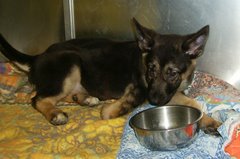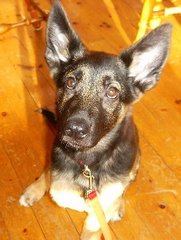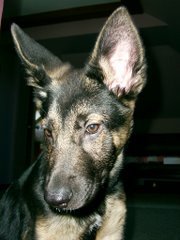I've been snooping around the internet, trying to find information about Jaida's deformity. We know that it is congenital, meaning that it was present at birth. There is very little literature publicly available that discusses deformities of the extremities (i.e. arms/hand and legs/feet) when it comes to animals. From what I've found, though, the medical terminology is the same for dogs and people. I've also contacted a few orthopedic veterinary specialists for some guesses about what kind of condition resulted in her little "club foot" (which technically is a "club hand", since it's on her foreleg). Here's what I've gathered to this point:
Jaida has a type of manus valgus. This is the generalized term used to describe a club hand that bends in towards the body. If the hand bends away from the body, it's called a manus vanus. This type of club hand is usually associated with a shortening or absence of the radius bone in the forearm, conditions respectively called radial hypoplasia and radial agenesis.
Radial clubhand (also called radial hemimelia) is the term used to describe this combination of of
manus valgus,

plus radial hypoplasia/agenesis. Radial clubhand is actually one of the more common hand/arm deformities in human children. In this child's x-ray, you can see how the radius is missing from the lower arm, leaving only the ulna (there should be two bones there), and the inwardly-turned wrist.
However, Jaida's recent x-rays show that her radius bone is not missing, and even though it's short, it's attached in the right places and is the same length as its "sister" bone, the ulna, so that rules out radial clubhand or radial hypoplasia. All of this to say:
She has an abnormal antebrachium. (Ha, you thought the big words were all done, didn't you?) The antibrachium is simply the forearm, the part of the arm between the elbow and the wrist, so that means: she has a screwy forearm. Cause? Still unknown. But the wrist itself is screwy too, no? Which leads us to...
Carpal contracture. The carpus is the wrist. A contracture is a tightening of muscle, tendons, ligaments, or skin that prevents normal movement. So, basically, the wrist is tightened up into an immovable "club" position.
The combination of these two things make it look

like she has radial hypoplasia (RH), with the associated club hand. RH was a possible diagnosis for Jaida until we got her x-rays. Here's a pic of a sweet little boxer baby with the RH condition. He was in a shelter in New York, last time I heard about him. They called him "Gumby". I hope he found a good home.
RH occurs in kitties too. They're often called "twisty" cats, and some really questi

onable people have gone as far as starting breeding programs to perpetuate the trait. I think it's safe to say that most people would not condone this practice (I, for one, do not). Interestingly, specialists say that RH is a heritable condition in cats, but that there is no evidence of heritability of RH in dogs - it's a fluke in canines, in other words.
Jaida and I will keep you posted if we are able to get any more information about her particular condition. Right now, it looks like a fairly unique type of malformity. We always knew she was one-of-a-kind!





